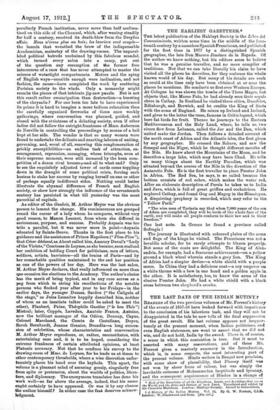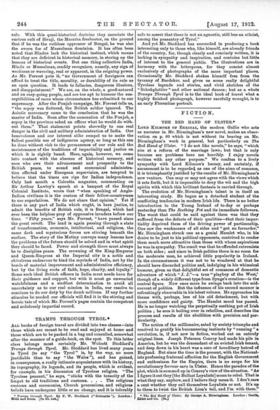THE LAST DAYS OF THE INDIAN lill7TINY.t READERS of the
two previous volumes of Mr. Forrest's history of the events of 1857-58 have looked forward with impatience to the conclusion of his laborious task, and they will not be disappointed in the tale he now tells of the final suppression of the great revolt. His last volume appears not inoppor- tunely at the present moment, when Indian politicians, and even English statesmen, are wont to assert that we did not win, and do not hold, India by the sword. There is, of course, a sense in which this contention is true. But it must be asserted with many reservations, and of these Mr. Forrest gives a masterly summary in the Introduction, which is, in some respects, the most interesting part of the present volume. Hindu writers in Bengal now proclaim, with some show of plausibility, that Plassey itself was not won by sheer force of valour, but was simply the inevitable outcome of Mohammedan ineptitude and tyranny, and the consequent acquiescence of Hindus in a change of • Book of the Knowledge of all the Kingdoms, Lands, and Lordships that are in the World, and the Arms and Devices of each Land. Translated and edited by Sir Clements Markham. London : Haklnyt Society. Issued to Subscribers.
t A History of the Indian Mutiny. Vol. iii. By G. W. Forrest. C.LE. London ; W. Blackwood and Sons. [20s. net.]
rule. With this quasi-historical doctrine they associate the curious cult of Sivaji, the Maratha freebooter, on the ground that if he was the ruthless oppressor of Bengal, he was also the sworn foe of Mussulman dominion. It has often been noted that Hindus lack the historical instinct, which means that they are deficient in historical memory, in storing up the lessons of historical events. But one thing collective India, Hindu or Mussulman, readily recognizes, namely, any sign of weakness or wavering, real or apparent, in the reigning power. As Mr. Forrest puts it, "no Government of foreigners can afford to treat the title, morality, or durability of its rule as an open question. It leads to fallacies, dangerous illusions, and disappointment." We are, on the whole, a good-natured and an easy-going people, and are too apt to humour the sus- ceptibilities of races whom circumstance has submitted to our supremacy. After the Punjab campaign, Mr. Forrest tells us, " the sepoy was flattered, the British soldier ignored. The Asiatic mercenary came to the conclusion that he was the master of India. Soon after the annexation of the Punjab, a sepoy in the province asked an officer what he would do with- out them." That statement points shrewdly to one real danger in the civil and military administration of India. Our benevolence and our interest alike compel us to make the fullest possible use of indigenous agency, so long as this can be done without risk to the permanence of our rule and the maintenance of the traditions of impartiality and justice on which it is rightly based. Here, again, however, we come into contact with the absence of historical memory, and men who owe their advancement and prosperity to the British peace, to sound and economical administra- tion effected under European supervision, are tempted to believe that the times are ripe for Indian independence. Only last month a Calcutta magazine, commenting on Sir Arthur Lawley's speech at a banquet of the Royal Colonial Institute, wrote that " when speaking of Anglo- Indian civilians it is the custom of their fellow-countrymen to use superlatives. We do not share that opinion." Yet if there is any part of India which ought, in bare justice, to admit the benefits of British rule, it is Bengal, which had ever been the helpless prey of oppressive invaders before our time. "Fifty years," says Mr. Forrest, "have passed since the great revolt. The land is again passing through a state of transformation, economic, intellectual, and religious, the same dark and mysterious forces are stirring beneath the surface. The story of the Mutiny conveys many lessons how the problems of the future should be solved and in what spirit they should be faced. Power and strength there must always be to discipline peace. The crowning of the King-Emperor and Queen-Empress at the Imperial city is a noble and chivalrous endeavour to bind the myriads of India, not by the bonds of material improvement and administrative efficiency, but by the living roots of faith, hope, charity, and loyalty." Some such ideal British officers in India must needs have for their guidance and support, but with it must go unwearied watchfulness and a stedfast determination to avoid all uncertainty as to our real mission in India, our resolve to continue to do our duty by the dumb millions. If any further stimulus be needed our officials will find it in the stirring and heroic tale of which Mr. Forrest's pages contain the competent and sedulously impartial record.







































 Previous page
Previous page